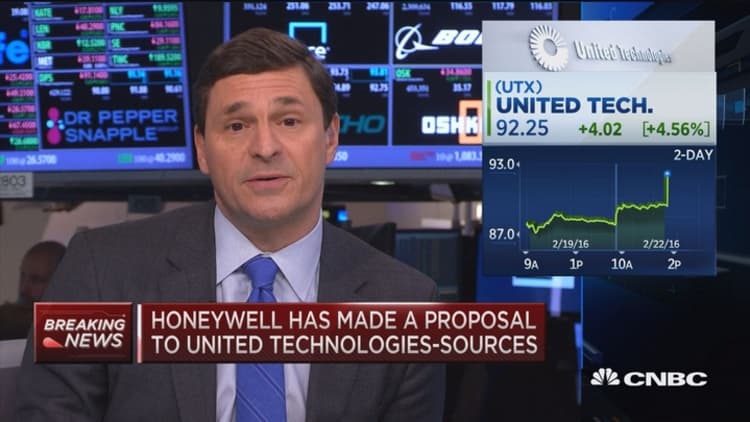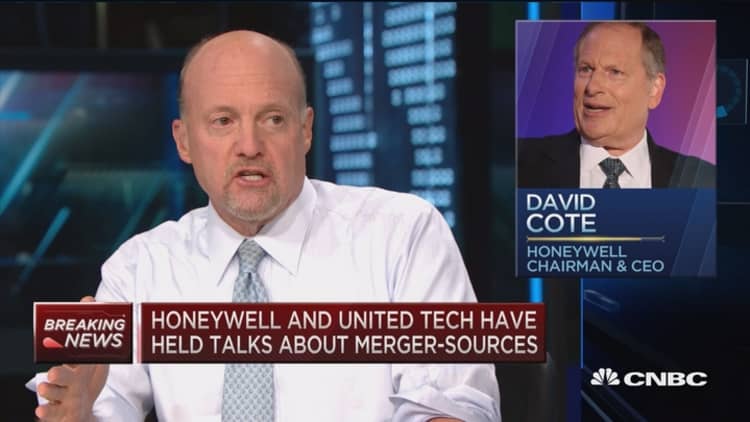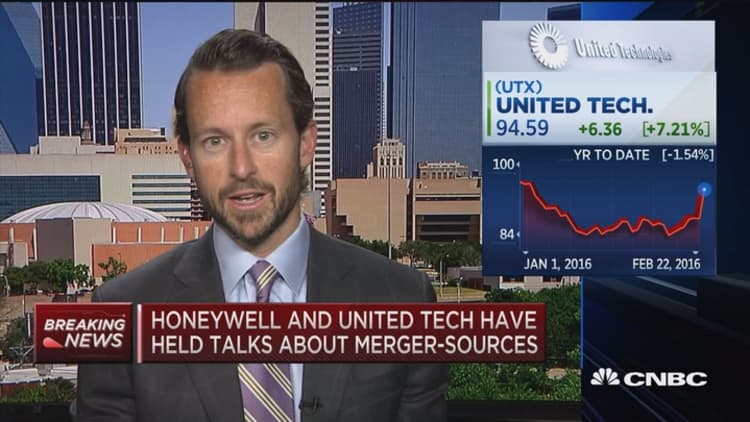


Aerospace giants Honeywell and United Technologies (UTX) recently held talks about a merger with the potential to create a $94 billion sales colossus, but United Technologies pulled out of the talks due to antitrust worries.
The discussions occurred within the past two weeks and were focused on a deal in which Honeywell offered a premium, largely in stock with some cash, for the smaller United Technologies. The Wall Street Journal reported late on Monday that the bid was worth $108 per UTX share, with $42 of the offer in cash, and that UXT holders would have owned 40 percent of the combined company.
Shares in United Technologies jumped when news of the possible deal broke on Monday, and Honeywell's stock wavered.
In a statement issued after reports of the talks emerged and after U.S. markets closed, United Technologies confirmed that it had been in "preliminary, exploratory conversations about a range of potential collaborative options with Honeywell," but said it did not explore the options further due to "significant regulatory obstacles, customer concerns and valuation issues."
There were significant concerns on the UTX side over whether any combination could pass an antitrust review, given the two companies provide so much of what goes into an airplane and would likely face opposition from the likes of Boeing and Airbus.
The talks represented the latest engagement in an on-again-off-again courtship that began almost a year ago and has changed shape as the respective market caps of the two companies diverged.
A spokesman for Honeywell, which initiated the most recent talks, declined to comment.
Last year, when UTX was larger in value than Honeywell, UTX CEO Greg Hayes approached his counterpart at Honeywell, David Cote, about the possibility of merging the two companies. Those discussions centered on a deal that represented a merger of equals, but would have had UTX management in control, according to people close to the conversations. Those talks broke down when United Technologies' stock price suffered significant declines and the two companies found themselves unable to agree on who would be in control of the combination.
Last fall, Honeywell turned the tables and approached UTX about a deal. The so-called "bear hug" letter that was sent to UTX offered its holders a slight premium for their shares, but was structured as a merger of equals, sources said. That proposal was turned down by UTX last October, which cited concern about antitrust risk as the key impediment. Honeywell decided against making the proposal public, and the two companies had no contact for the months that followed.
But as Honeywell's stock outperformed UTX and its market value grew to be roughly $10 billion more than UTX, it was emboldened to try again. In recent weeks, Cote presented a new cash and stock proposal that would provide a premium to UTX holders. The exact terms of the proposal could not be determined, but given their respective sizes, any combination would end up with roughly equal ownership of a combination.
The industrial logic of a combination has been a focus of current and previous managements at both companies. In October 2000, UTX was close to a deal to buy Honeywell — only to watch that deal trumped by an offer from GE, which after opposition from EU regulators found itself unable to close the transaction.
The two companies are leaders in aviation and aerospace, where UTX's Pratt & Whitney makes aircraft engines and both companies provide the avionics and other systems that let airplanes fly. They are also both large players in the climate control business. Given their respective market shares, any combination would be expected to face a significant antitrust review not just in the U.S., but in Europe as well.



